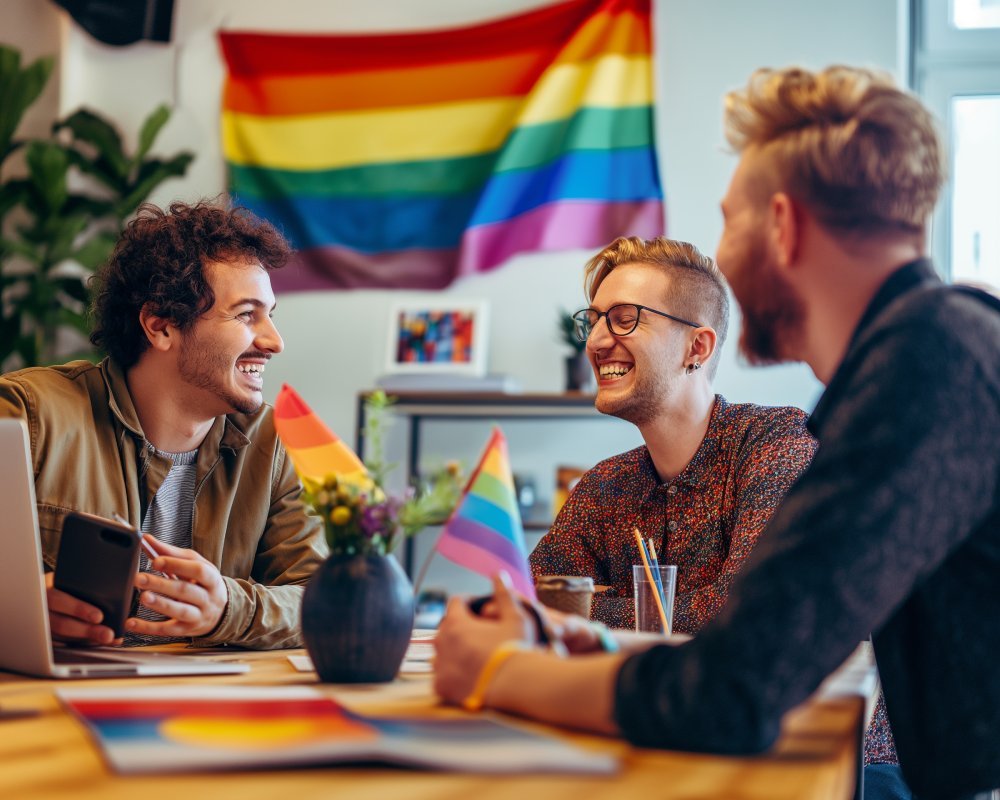
A Comprehensive Guide to Understanding Same-Sex Marriage – What Is Gay Marriage?
What is gay marriage? Also known as same-sex marriage, gay marriage refers to the legal union between two individuals of the same sex. Over the past few decades, the topic of gay marriage has become one of the most debated and discussed issues in politics, religion, and society. While gay marriage is now legal in many countries, it was once a controversial and divisive issue that sparked protests, legal battles, and societal shifts.
This blog will explore what is gay marriage, its historical context, the legal and social battles that have been fought over it, and its impact on the LGBTQ+ community and society at large. We will also highlight some interesting facts and provide answers to common questions about gay marriage, helping you gain a better understanding of what it truly represents.
What Is Gay Marriage? A Historical Perspective
To truly understand what is gay marriage, we must first take a look at its history. Same-sex relationships have existed for centuries, but the concept of marriage between two individuals of the same sex is relatively recent in terms of legal recognition. For much of human history, marriage was considered an institution reserved exclusively for heterosexual couples, often for procreation and economic purposes.
In the 20th century, as LGBTQ+ rights movements gained traction, the conversation around marriage equality began to take shape. The push for gay marriage initially emerged as part of a broader fight for LGBTQ+ rights, including the decriminalization of homosexuality and the fight for anti-discrimination laws. In the 1990s, same-sex couples began filing lawsuits seeking the right to marry, arguing that denying them this right was a violation of equal protection under the law.
One of the most significant early cases in the fight for gay marriage was Baehr v. Lewin, a 1993 Hawaii Supreme Court ruling that declared the state’s prohibition on same-sex marriage unconstitutional. While the ruling didn’t immediately legalize gay marriage in Hawaii, it set the stage for a broader conversation on the issue.
The first country to legalize gay marriage was the Netherlands in 2001. This historic event marked the beginning of a wave of legal recognition for same-sex marriages across Europe, the Americas, and other parts of the world. The movement for marriage equality continued to gain momentum in the years that followed, leading to significant legal victories in several countries.

What Is Gay Marriage? A Legal and Political Battle
What is gay marriage in terms of the legal and political battles fought to achieve marriage equality? For many, the journey to legal recognition of same-sex marriage has been long and challenging. Activists, lawyers, and LGBTQ+ organizations have worked tirelessly to challenge discriminatory laws and advocate for equal treatment under the law.
One of the most pivotal moments in the fight for gay marriage occurred in the United States. The battle for same-sex marriage in the U.S. was a drawn-out legal and political struggle that played out in courtrooms, state legislatures, and even at the Supreme Court. The turning point came in 2015 with the landmark Supreme Court case Obergefell v. Hodges. The court ruled in a 5-4 decision that the Constitution guarantees the right to same-sex marriage, making gay marriage legal in all 50 states.
Before the Obergefell ruling, same-sex marriage was already legal in several states, including Massachusetts, which became the first state to legalize gay marriage in 2004. However, the Supreme Court’s decision ensured that all states had to recognize and perform same-sex marriages, making the U.S. one of many countries where gay marriage was fully legal.
Other countries followed suit in legalizing gay marriage. Countries like Spain, Canada, Argentina, and South Africa were early adopters of marriage equality, and today, over 30 countries have legalized gay marriage. Each of these countries faced its own unique legal and political challenges, but the trend toward recognizing the rights of same-sex couples to marry continues to grow.
Advertisement · Scroll to continue
Recommended
What Is Gay Marriage? A Social and Cultural Revolution
Gay marriage is not just a legal issue—it also represents a social and cultural revolution. So, what is gay marriage in terms of its social and cultural impact? The legalization of gay marriage has not only granted legal rights and protections to same-sex couples but has also shifted societal attitudes toward LGBTQ+ individuals and relationships.
For centuries, marriage was viewed as a heteronormative institution, tied to traditional gender roles and family structures. The introduction of gay marriage challenged these norms, expanding the definition of marriage to include a broader range of relationships. This shift has helped to break down stigmas surrounding LGBTQ+ people and has contributed to a more inclusive and accepting society.
In many places where gay marriage has been legalized, social attitudes toward LGBTQ+ people have improved. Studies have shown that the legalization of same-sex marriage can lead to a decrease in homophobia and an increase in acceptance. Public opinion has gradually shifted in favor of gay marriage, with polls in many countries showing a majority of citizens supporting marriage equality.
The cultural impact of gay marriage is also evident in the media. Representation of same-sex couples in television shows, movies, and advertisements has increased significantly in recent years. Same-sex weddings have become a regular feature in popular culture, helping to normalize these relationships and provide visibility for LGBTQ+ individuals.

The Benefits of Gay Marriage: Legal, Emotional, and Social
What is gay marriage, and what are the benefits of legalizing it? Same-sex couples have long sought the right to marry not only for symbolic reasons but also for the practical and legal benefits that marriage provides. Here are some of the key benefits of gay marriage:
- Legal Protections: Marriage provides a range of legal protections for couples, including the right to make medical decisions for a spouse, inheritance rights, tax benefits, and access to spousal health insurance. Prior to the legalization of gay marriage, same-sex couples often lacked these protections, leading to significant hardships.
- Parental Rights: Marriage can provide same-sex couples with parental rights, making it easier for them to adopt children or gain legal recognition as the parents of their children. In many places, gay couples faced legal hurdles when it came to adoption, and marriage has helped to address these issues.
- Emotional and Social Validation: Marriage is often seen as a public declaration of love and commitment. For many same-sex couples, being able to marry provides emotional validation and a sense of social acceptance. It signals that their relationship is valued and recognized by society on an equal footing with heterosexual marriages.
- Improved Mental Health: Research has shown that the legalization of gay marriage can have positive effects on the mental health and well-being of LGBTQ+ individuals. Studies suggest that gay marriage can reduce feelings of isolation and discrimination, leading to improved mental health outcomes for LGBTQ+ people.
Opposition to Gay Marriage: Arguments and Counterarguments
While gay marriage has gained widespread acceptance in many parts of the world, there are still pockets of opposition. What is gay marriage from the perspective of those who oppose it, and what are their arguments?
- Religious Beliefs: Many of the arguments against gay marriage stem from religious beliefs. Some religious groups argue that marriage is a sacred institution between one man and one woman, and that gay marriage violates the teachings of their faith. However, there are also many religious groups and leaders who support marriage equality, arguing that love and commitment should be celebrated regardless of gender.
- Traditional Family Values: Another argument against gay marriage is the belief that it undermines traditional family values. Opponents argue that marriage should be reserved for heterosexual couples who can biologically reproduce. However, this argument ignores the fact that many heterosexual couples cannot or choose not to have children, and that same-sex couples can also create loving families through adoption or other means.
- Slippery Slope: Some opponents of gay marriage argue that legalizing it could lead to the acceptance of other non-traditional relationships, such as polygamy or incest. However, this argument is widely considered a “slippery slope” fallacy, as there is no evidence to suggest that legalizing gay marriage would lead to the normalization of other forms of relationships.
- Impact on Children: Critics of gay marriage have also raised concerns about the impact on children raised by same-sex couples. However, numerous studies have shown that children raised by same-sex couples fare just as well, if not better, than children raised by heterosexual couples. Research indicates that the well-being of children is more closely tied to the quality of parenting rather than the gender or sexual orientation of their parents.
Despite these arguments, the majority of legal and scientific bodies support marriage equality, and many of the concerns raised by opponents of gay marriage have been debunked by research and evidence.

Advertisement · Scroll to continue
Recommended
What Is Gay Marriage Around the World? A Global Perspective
What is gay marriage in a global context? The legal status of gay marriage varies widely from country to country. While more than 30 countries have legalized gay marriage, there are still many places where same-sex marriage is illegal or where LGBTQ+ individuals face persecution for their relationships.
Here is a brief overview of the status of gay marriage in different parts of the world:
- North America: In the United States, gay marriage was legalized nationwide in 2015. Canada has recognized same-sex marriages since 2005, making it one of the first countries to do so. In Mexico, same-sex marriage is legal in some states, but not yet nationwide.
- Europe: Several European countries have legalized gay marriage, including the Netherlands (the first country to do so), Spain, France, the United Kingdom, Germany, and Ireland. However, some countries in Eastern Europe, such as Poland and Hungary, remain resistant to marriage equality.
- South America: Gay marriage is legal in several South American countries, including Argentina, Brazil, Uruguay, and Colombia. These countries have been at the forefront of LGBTQ+ rights in the region.
- Africa: Africa remains one of the most challenging regions for LGBTQ+ rights. While South Africa legalized gay marriage in 2006, it remains the only country on the continent where same-sex marriage is legal. In many African countries, homosexuality is still criminalized, and same-sex couples face severe persecution.
- Asia: In Asia, the progress toward marriage equality has been slower. Taiwan became the first country in Asia to legalize same-sex marriage in 2019. However, many other countries in the region, such as China, India, and Japan, have yet to recognize gay marriage.
As the fight for marriage equality continues, activists and LGBTQ+ organizations around the world are working to ensure that same-sex couples have the same rights and recognition as heterosexual couples.
Interesting Facts About Gay Marriage
- The First Gay Marriage: The Netherlands became the first country in the world to legalize gay marriage in 2001.
- Impact on Mental Health: Research shows that legalizing gay marriage has positive effects on the mental health of LGBTQ+ individuals, reducing anxiety, depression, and suicidal thoughts.
- Gay Marriage in Pop Culture: Gay marriage has been featured in popular films and TV shows, helping to normalize same-sex relationships. Some examples include the movie The Kids Are All Right and the TV show Modern Family.
- Ireland’s Vote for Equality: In 2015, Ireland became the first country in the world to legalize gay marriage by a popular vote, with over 62% of voters in favor of the change.
- Same-Sex Weddings: Same-sex weddings have created new traditions and customs, with many couples choosing to forgo traditional gender roles and embrace more inclusive practices in their ceremonies.
- Adoption Rights: In many countries, legalizing gay marriage has also paved the way for adoption rights for same-sex couples, allowing them to adopt children and form families.
- Influence on Marriage Trends: In countries where gay marriage has been legalized, some studies suggest that marriage rates among heterosexual couples have also increased, possibly due to the positive visibility of marriage equality.
- Same-Sex Divorce: Gay marriage also comes with the reality of same-sex divorce. As same-sex marriages become more common, same-sex divorces are also on the rise, raising new legal questions about asset division, custody, and alimony.
- Public Opinion Shifts: Over the past two decades, public opinion on gay marriage has shifted dramatically, with increasing numbers of people supporting marriage equality worldwide.
- Celebrity Gay Weddings: High-profile celebrity weddings, such as Ellen DeGeneres and Portia de Rossi’s nuptials, have helped raise awareness about marriage equality and LGBTQ+ rights.

FAQs About What Is Gay Marriage?
1. What is gay marriage?
Gay marriage, also known as same-sex marriage, refers to the legal union between two individuals of the same sex, granting them the same legal rights and recognition as heterosexual couples.
2. When was the first country to legalize gay marriage?
The Netherlands was the first country in the world to legalize gay marriage in 2001.
3. Is gay marriage legal in the United States?
Yes, gay marriage has been legal in the United States since 2015, following the Supreme Court’s decision in *Obergefell v. Hodges*.
4. What are the benefits of gay marriage?
Benefits of gay marriage include legal protections such as inheritance rights, tax benefits, parental rights, and access to spousal health insurance, as well as emotional and social validation.
5. How does gay marriage affect LGBTQ+ mental health?
Studies show that legalizing gay marriage can lead to improved mental health for LGBTQ+ individuals, reducing feelings of isolation and discrimination.

6. Why do some people oppose gay marriage?
Opposition to gay marriage is often based on religious beliefs, concerns about traditional family values, and fears about its impact on society. However, many of these arguments have been debunked by research.
7. Is gay marriage legal worldwide?
Gay marriage is legal in over 30 countries, but it is still illegal in many parts of the world, particularly in Africa and Asia.
8. What is the significance of *Obergefell v. Hodges*?
The Supreme Court case *Obergefell v. Hodges* was a landmark decision that legalized gay marriage in all 50 U.S. states in 2015.
9. Can gay couples adopt children?
In many countries where gay marriage is legal, same-sex couples are also allowed to adopt children and gain parental rights.
10. What is the relationship between gay marriage and religious freedom?
While some religious groups oppose gay marriage, others support marriage equality. The debate often centers on balancing religious freedom with the rights of LGBTQ+ individuals.
11. How does gay marriage impact society?
Research suggests that gay marriage can lead to greater acceptance of LGBTQ+ people and help reduce homophobia, while also contributing to a more inclusive society.

12. What are some famous cases of gay marriage?
Some famous cases include *Obergefell v. Hodges* in the United States and the 2001 legalization of gay marriage in the Netherlands.
13. How has the media portrayed gay marriage?
The media has increasingly portrayed same-sex marriages in a positive light, helping to normalize these relationships through television shows, movies, and advertisements.
14. Can gay couples get divorced?
Yes, same-sex couples who are legally married can get divorced, and they face the same legal processes as heterosexual couples when it comes to dividing assets and determining custody.
15. What are the arguments for legalizing gay marriage?
Arguments for legalizing gay marriage include promoting equality, providing legal protections for same-sex couples, and recognizing the validity of love and commitment between individuals of the same sex.
16. How has public opinion on gay marriage changed over time?
Public opinion on gay marriage has shifted dramatically in recent decades, with increasing support for marriage equality across many countries.
17. What is the impact of gay marriage on traditional marriage?
Research shows that gay marriage has had no negative impact on traditional marriage and that marriage equality has actually strengthened the institution by making it more inclusive.

18. Can gay marriage ceremonies follow traditional customs?
Yes, many gay couples choose to incorporate traditional customs into their wedding ceremonies, while others create new traditions that reflect their unique relationships.
19. What is the role of celebrity weddings in promoting gay marriage?
Celebrity weddings have played a significant role in raising awareness about marriage equality and normalizing same-sex relationships in the public eye.
20. What are some countries that recently legalized gay marriage?
Taiwan (2019) and Chile (2021) are examples of countries that have recently legalized gay marriage.
21. How does the legalization of gay marriage impact LGBTQ+ youth?
The legalization of gay marriage can provide LGBTQ+ youth with positive role models and a sense of hope, showing that their relationships are valued and recognized by society.
22. How has the legalization of gay marriage affected LGBTQ+ discrimination?
While discrimination still exists, the legalization of gay marriage has contributed to increased acceptance and reduced stigma for LGBTQ+ individuals.
23. What is the role of gay marriage in the fight for LGBTQ+ rights?
Gay marriage is a central issue in the broader fight for LGBTQ+ rights, representing both legal equality and social acceptance for same-sex couples.

24. What is the future of gay marriage?
The future of gay marriage will likely involve continued progress toward global recognition, with more countries legalizing same-sex marriage and providing equal rights to LGBTQ+ couples.
Advertisement · Scroll to continue

More Recommended
How to Be an Effective Ally to Gay Individuals
How to Be an Effective Ally to Gay Individuals Being an effective ally to gay [...]
How to Navigate the Gay Scene as an Introvert
How to Navigate the Gay Scene as an Introvert – Navigating the gay scene as [...]
Did Target bring back DEI?
Did Target bring back DEI? – Target has recently made headlines with discussions around its [...]
What Is the Best Gay Dating Advice for Beginners?
What Is the Best Gay Dating Advice for Beginners? – Diving into the world of [...]
Why Are Olivia Cruises So Expensive?
Why Are Olivia Cruises So Expensive? Exploring the Cost of Exclusive LGBTQ+ Travel Olivia Cruises [...]
How to Deal With Homophobia as a Gay Teen
How to Deal With Homophobia as a Gay Teen – Navigating the tumultuous journey of [...]
LGBTQ Couples
LGBTQ+ Couples: Histories, Realities, and the Future of Love 1.LGBTQ+ Couples – Introduction LGBTQ+ couples—spanning [...]
What Are the Best Gay Lifestyle Magazines?
What Are the Best Gay Lifestyle Magazines? – The LGBTQ+ community has a vibrant and [...]
How to Come Out as Gay in College
How to Come Out as Gay in College – Are you a college student struggling [...]